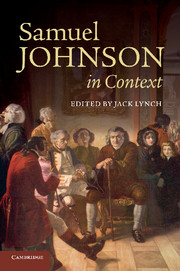Book contents
- Frontmatter
- Contents
- Illustrations
- Contributors
- Preface
- Chronology
- Abbreviations
- Part I Life and works
- Part II Critical fortunes
- Part III Contexts
- Chapter 10 America
- Chapter 11 Anglicanism
- Chapter 12 Anthropology
- Chapter 13 Authorship
- Chapter 14 Biography
- Chapter 15 Book trade
- Chapter 16 Clubs
- Chapter 17 Conversation
- Chapter 18 Dictionaries
- Chapter 19 Domestic life
- Chapter 20 Education
- Chapter 21 Empire
- Chapter 22 Essays
- Chapter 23 Fiction
- Chapter 24 History
- Chapter 25 Journalism
- Chapter 26 Law
- Chapter 27 Literary criticism
- Chapter 28 London
- Chapter 29 Medicine
- Chapter 30 Mental health
- Chapter 31 Money
- Chapter 32 Nationalism
- Chapter 33 Philosophy
- Chapter 34 Poetry
- Chapter 35 Politics
- Chapter 36 Scholarship
- Chapter 37 Science and technology
- Chapter 38 Scotland
- Chapter 39 Sermons
- Chapter 40 Shakespeare
- Chapter 41 Slavery and abolition
- Chapter 42 Social hierarchy
- Chapter 43 Theatre
- Chapter 44 Travel
- Chapter 45 Visual arts
- Chapter 46 War
- Chapter 47 Women writers
- Further reading
- Index
- References
Chapter 30 - Mental health
from Part III - Contexts
Published online by Cambridge University Press: 05 June 2012
- Frontmatter
- Contents
- Illustrations
- Contributors
- Preface
- Chronology
- Abbreviations
- Part I Life and works
- Part II Critical fortunes
- Part III Contexts
- Chapter 10 America
- Chapter 11 Anglicanism
- Chapter 12 Anthropology
- Chapter 13 Authorship
- Chapter 14 Biography
- Chapter 15 Book trade
- Chapter 16 Clubs
- Chapter 17 Conversation
- Chapter 18 Dictionaries
- Chapter 19 Domestic life
- Chapter 20 Education
- Chapter 21 Empire
- Chapter 22 Essays
- Chapter 23 Fiction
- Chapter 24 History
- Chapter 25 Journalism
- Chapter 26 Law
- Chapter 27 Literary criticism
- Chapter 28 London
- Chapter 29 Medicine
- Chapter 30 Mental health
- Chapter 31 Money
- Chapter 32 Nationalism
- Chapter 33 Philosophy
- Chapter 34 Poetry
- Chapter 35 Politics
- Chapter 36 Scholarship
- Chapter 37 Science and technology
- Chapter 38 Scotland
- Chapter 39 Sermons
- Chapter 40 Shakespeare
- Chapter 41 Slavery and abolition
- Chapter 42 Social hierarchy
- Chapter 43 Theatre
- Chapter 44 Travel
- Chapter 45 Visual arts
- Chapter 46 War
- Chapter 47 Women writers
- Further reading
- Index
- References
Summary
SA′NITY. n.s. [sanitas, Latin.] Soundness of mind.
How pregnant, sometimes, his replies are?
A happiness that often madness hits on,
Which sanity and reason could not be
So prosp’rously delivered of. Shakesp. Hamlet.
The long eighteenth century was the period in Britain and Western Europe when the mind came into its own. Thought – including progress in science and medicine and in the understanding of the mind itself – was at last, after the religious and civic turmoils of the seventeenth century, deriving the full benefit of those decisive breaks with the past that had occurred during the European Renaissance. Increasingly liberated from the remaining pockets of medievalism, such as humoral theory in understanding the body, and from strict religious oversight of what might be thought and written, scientists were able, probably for the first time, to give full rein to those fundamentals of modern science, free thought and factual observation. William Harvey, early in the seventeenth century, identified and demonstrated the circulation of the blood; Isaac Newton, half a century later, discovered the movements and orbits of lunar and planetary bodies. In the same way, the celebrated physician Thomas Willis argued in his Cerebri anatome (1664) that the human brain operated through a series of nervous impulses and reactions, basing his conclusions on clinical observation and experiment. The whole human organism was being recognized as more dynamic, more mechanical, and far more surprising than earlier generations of scientists had dared to think, and the most exciting faculty of all in the new body was the mind itself. There was more to thought, it began to appear, than we thought.
Philosophy and the mind
While some were observing the brain and the nervous system, other thinkers and medical men were turning their attention to issues concerning the mind – to what was being thought and why. Here the key figure was John Locke, the philosopher and physician. An Essay concerning Human Understanding (1690) was probably the single most influential philosophical work upon the study of mind for the century that followed (see chapter 33, “Philosophy”). By denying the existence of innate ideas and deriving all knowledge from sense or sensation, Locke separated thought from any residual traces of what might have been a divine template, and positioned it instead firmly within the individual organism, its species characteristics, and its distinctive quirks and malfunctions. In doing so, he set the agenda for attitudes towards issues of identity, of mental normality and abnormality, of popular as well as philosophical understanding of sanity and insanity, and of education for a chain of thinkers who followed.
- Type
- Chapter
- Information
- Samuel Johnson in Context , pp. 260 - 267Publisher: Cambridge University PressPrint publication year: 2011



